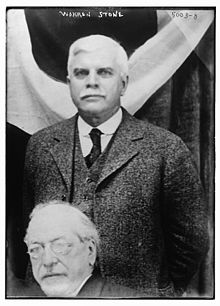Warren Stanford Stone
| Warren Stanford Stone | |
|---|---|

Stone in 1919
|
|
| Born |
1 February 1860 Ainsworth, Iowa |
| Died | 12 June 1925 (aged 65) Cleveland, Ohio |
| Nationality | American |
| Occupation | Locomotive Engineer |
| Known for | Grand Chief, Brotherhood of Locomotive Engineers |
Warren Stanford Stone (1 February 1860 – 12 June 1925) was a railway worker who rose to head the Brotherhood of Locomotive Engineers in the United States from 1903 to 1925. He was unusual as a labor leader in that he did not believe in compulsory union membership and was comfortable with "labor capitalism". He supported a radical plan in which workers in an industry would take one third of the profits, the other thirds going to capital and the public. By the end of his tenure the Brotherhood controlled investments worth over $100 million.
Warren Stanford Stone was born on 1 February 1860 on a farm near Ainsworth, Washington County, Iowa. He attended Western College, Iowa. When Stone completed his academic education in May 1879, he considered studying to become a surgeon, while his father wanted him to become a lawyer. Instead of taking either course, he started work on a railway. He obtained a job as a locomotive fireman with the Chicago, Rock Island and Pacific Railroad in 1879, based in Eldon, Iowa. He was promoted to engineman five years later. He spent a further nineteen years in this position. In 1884 he married Carrie E. Newell. They had no children.
In August 1903 Stone was elected grand chief engineer of the International Brotherhood of Locomotive Engineers to succeed Peter M. Arthur, who had died unexpectedly. Stone was a Republican but had progressive views. Several U.S. presidents offered him political appointments, but he refused them. Stone believed that if a worker "wants to join a union, all right, but it is contrary to the principles of free government and the Constitution of the United States . . . to make him join." He had no problem with "labor capitalism", where union members would invest their savings to achieve the maximum return, even if that meant investing in non-union enterprises.
Stone was proposed as a challenger to Samuel Gompers, President of the American Federation of Labor at that organization's Chicago conference in January 1920. Gompers believed the federation should take a non-socialist approach in representing wage-earners, campaigning for better wages, better hours, better working conditions and the unfettered right to strike. Stone supported the radical Glenn E. Plumb plan for tripartite control of the railway industry by labor, capital and the public, and supported similar plans for other industries.
...
Wikipedia
